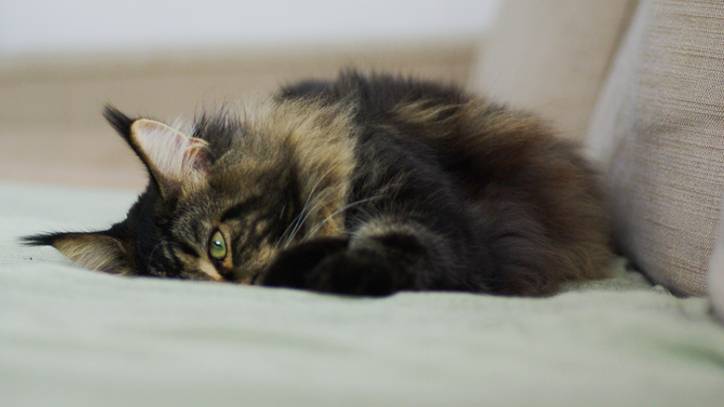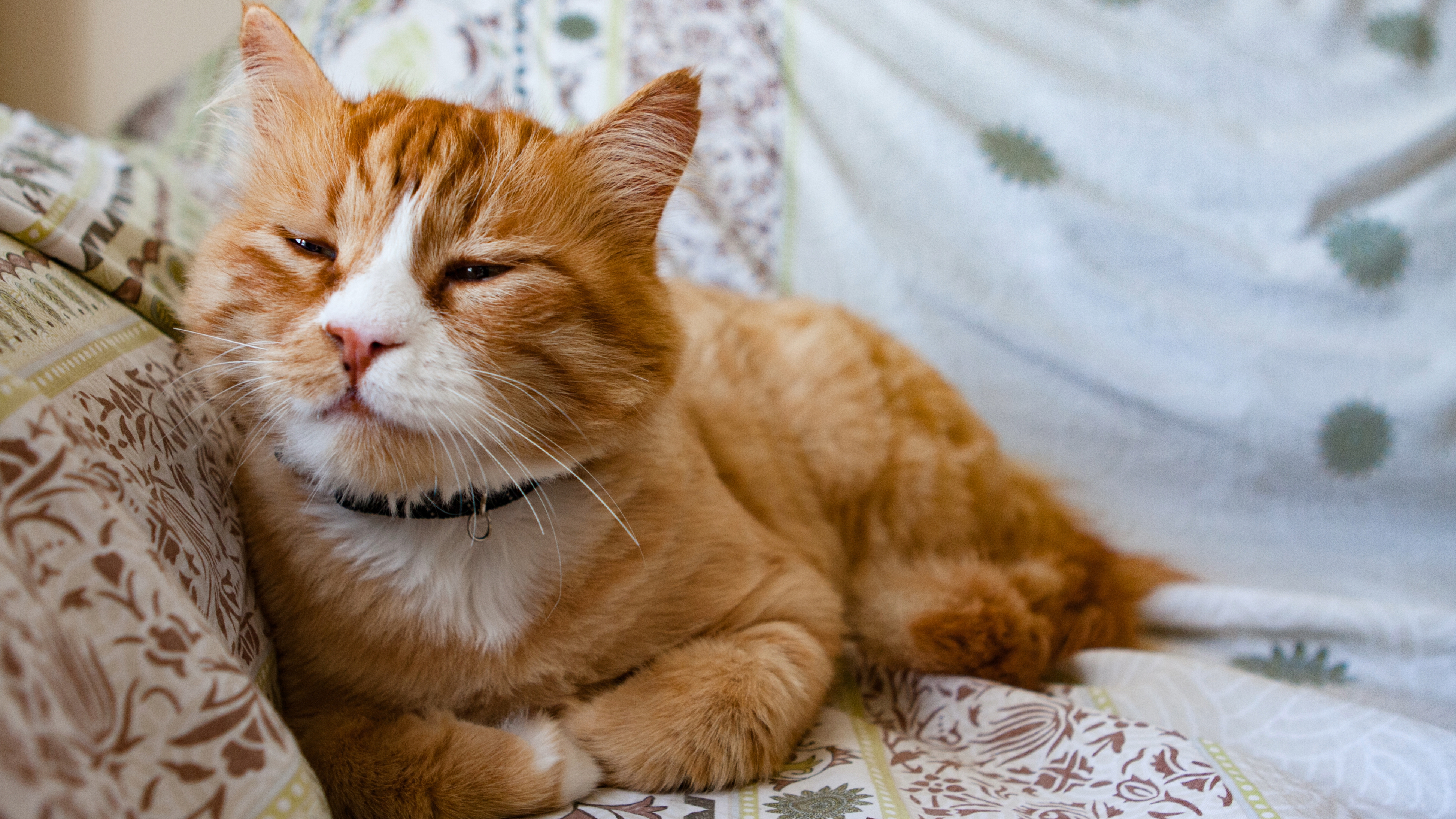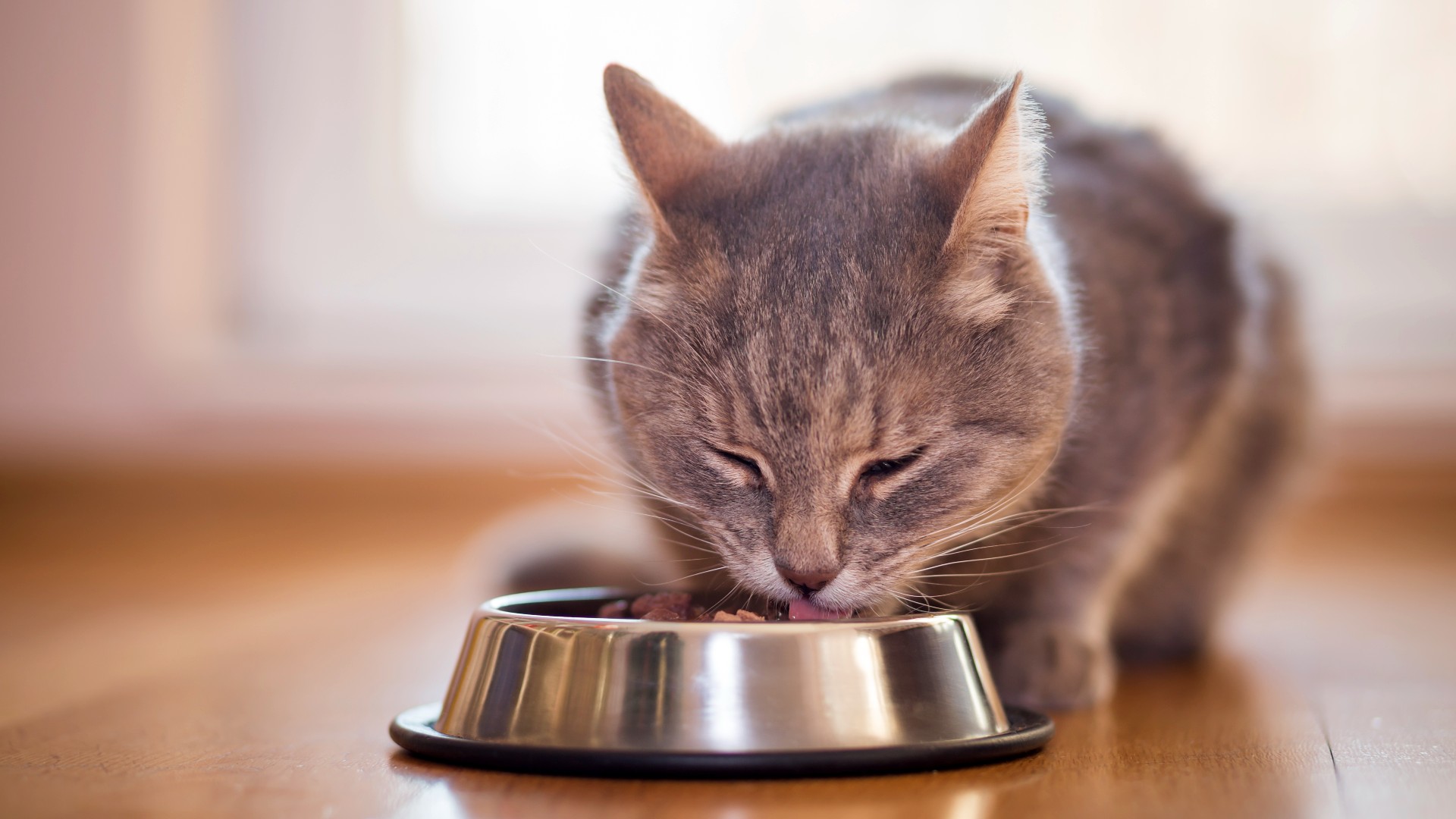Upset stomach in cats: Vet reveals how to sooth your feline's tummy troubles
An upset stomach in cats can make life miserable for everyone — but our vet has plenty of great advice on what you can do at home and when it’s time to seek professional help.

An upset stomach in cats can be a miserable experience, both for your feline friend and everyone else in the family! Witnessing your cat vomiting or having diarrhea or other symptoms can be distressing and it can be hard to figure out the cause or the best course of treatment.
For some kitties, gobbling down too much of the best cat food too quickly can throw their body into digestive distress. For others, underlying health issues, such as kidney disease, worms or pancreatitis, can all cause stomach issues.
It can be tricky to know what to do if your cat is throwing up or showing other signs of an upset stomach, but before you contemplate the contents of your medical cabinet, it’s important to note that cat stomach issues are very different to the ones we experience as humans.
That’s why we turned to vet Dr. Joanna Woodnutt to get her advice on this complex issue. Below, she outlines the signs and symptoms to be on the lookout for that indicate your cat may have an upset stomach, the most common causes and how to treat it, including when to seek expert help. Let’s take a look...
Signs and symptoms of an upset stomach in cats
First, let’s consider what the symptoms of an upset stomach in cats are. Obviously, vomiting is a common sign – but there are more subtle signs that are easier to miss. Cats with tummy troubles may show some of the following signs:
- Vomiting
- Diarrhea
- Drooling
- Not eating properly
- Stomach pain (often seen as a hunched posture)
- Grumpiness
- Hiding away more
If you have a cat throwing up food after eating or at random times of the day, or they're showing any of the other signs listed above, there’s a chance they have an upset stomach, although there are also other conditions that can cause some of these signs.

Causes of an upset stomach in cats
So, what can cause an upset stomach in cats? As mentioned above, there are lots of possible causes. Some are more serious than others.
Determining the cause of vomiting and diarrhea in cats is often difficult, and you might find that your veterinarian simply rules out the more concerning causes before treating the symptoms, rather than trying to find an exact diagnosis:
1. Bad food
Your cat’s upset stomach might be caused by something they have eaten. This could be bad food, or food that doesn’t agree with them, which may set off gastritis and cause vomiting and other upset stomach symptoms.
More worrying things your cat may have eaten to cause an upset stomach are toxins, which often cause vomiting as an early sign of poisoning. These toxins can be around the home or out and about, and it’s often impossible to be sure that a cat hasn’t had something toxic.
Some toxins are mild, though, and unless your cat is showing other symptoms they usually respond to symptomatic treatment.
Check out our guides to what human foods can cats eat and five human foods that are poisonous to cats for more information on this issue.
2. Eating a foreign object
Your cat may have eaten something inedible. This can form a bowel obstruction or ‘foreign body’ in the guts. This is an extremely serious cause of vomiting in cats and can even be fatal.
Unlike dogs, cats are less likely to eat a ball or bone to cause a foreign body obstruction, but they are very prone to ‘linear foreign bodies’. These are pieces of string, tinsel, or other long objects that get stuck and gather up the guts in an accordion shape, eventually scissoring through the intestines.
Any prolonged or serious bout of vomiting in cats should be investigated for foreign body obstructions before becoming stuck.
3. Health issues
There are some diseases and common illness in cats that can cause an upset stomach. In cats with recurrent or persistent upset stomachs, your vet might recommend investigating other diseases.
In older cats, kidney disease, kidney failure, hyperthyroidism, and cancer are possible causes of an upset stomach. In younger cats, IBD, pancreatitis and worms could all cause vomiting, appetite problems, and diarrhea in cats.

What do you give a cat with an upset stomach?
If your cat has an upset stomach, your vet will help you to determine the cause and the best treatment. What is wrong with your cat will determine what to give them to make them feel better.
Your vet might prescribe probiotics, a special diet, or medication to treat an underlying disease like hyperthyroidism. In mild cases, simply giving anti-emetic (anti-vomit) medications can be enough to soothe their upset stomach.
In other cases, your cat might need to be hospitalised for a fluid drip, especially if dehydration becomes an issue or they can’t keep water down.
Home remedies for a cat upset stomach
If your cat has an upset stomach, you should consider a vet visit. However, if your cat is otherwise themselves, their upset stomach has been going on for less than 24 hours, and they can keep water down, there are some things you can try at home.
Firstly, it’s best not to change their diet unless you think the food is the cause of their problems. Sudden changes in diet can cause an upset stomach so keeping things consistent is important.
Instead, feed them small amounts of the best dry cat food or wet food that you usually give them in little and often portions. If your cat eats only dry food, you may want to give them highly digestible wet food or soak their biscuits to help them remain hydrated.
Most home remedies for a cat upset stomach aren’t worth trying. Antacids for humans are not suitable for cats, and many herbal remedies intended for humans can be poisonous to cats, so you shouldn’t use any human medications.
Similarly, human foods often won’t settle an upset stomach as they’re hard to digest or even toxic. Instead, stick to cat food. Probiotics for cats are also available, and may help treat your cat’s upset stomach in mild cases of diarrhea.
If your cat is prone to tummy troubles, there are some simple things you can do to soothe or prevent their upset stomach:
1. Check their diet
The main way to prevent an upset stomach in cats is through their diet. Make sure that their food is suitable. Many cases of persistent or recurrent tummy troubles can be improved with a change of diet. However, the best cat food for cats with an upset stomach varies depending on the cause.
Since food allergy and IBD can be a cause of upset stomachs, starting a prescription hydrolysed diet may also be an option. Try to avoid anything that isn’t complete and balanced according to FEDIAF/AAFCO standards – these homemade or small-batch diets can cause serious problems.
Raw food can also be a cause for concern as any parasites or bacteria in the food aren’t killed by cooking and can cause an upset stomach – feeding a cooked diet is recommended. Don’t forget, when changing cat food to introduce the new food gradually to avoid upsetting them further.
2. Create smaller meals
Cats are natural hunters that would eat several small meals a day. Replicating this can prevent some stomach issues.
Try splitting your cat’s daily calorie intake between five-six smaller meals. You can even use a timed feeder to portion out the meals whilst you are at work.
How long does an upset stomach last in cats?
How long a cat upset stomach lasts depends on the cause. In some cases, they will resolve within 24 hours.
In others, they’ll become steadily more ill – never forget that some causes of an upset stomach in cats can be fatal if not treated promptly.

When should I worry about my cat’s upset stomach?
It’s never wrong to take your cat to the vet for an upset stomach. Cats are less likely to get mild 24-hour upset stomach cases than dogs, so you should always be on the alert if your cat gets an upset stomach. The things that should prompt a vet visit include:
- Upset stomach for more than 24 hours
- Lethargy
- Unable to keep water down
- Unwilling to eat anything
- Known or likely toxin or foreign body ingestion
- Recurrent upset stomachs (more than one episode every six months)
In addition, you should always take your cat to the vet for an upset stomach if you are worried about them. Trust your instincts!
Upset stomachs in cats can be serious and should never be taken lightly. Whilst some cases will resolve on their own, many do not and may need surgery or hospitalization. In most vomiting cases, there are no treatments to give at home that will help.
However, if your vet has ruled out serious disease a gradual change to a different diet may help some cats, with hydrolysed diets, biome diets, and single-protein diets all useful in different cases. Watch carefully for signs your cat needs taking to the vet.
Cat eating too fast? A vet explains why in this feature.

Dr Joanna Woodnutt qualified as a veterinarian from the University of Nottingham where she then went on to practice companion animal medicine in the Midlands. She really took to the consulting side of things and helping clients with medical problems such as dermatology, behaviour and nutrition - anything that involved helping clients understand their pets better.
PetsRadar Newsletter
Get the best advice, tips and top tech for your beloved Pets
After graduating as a vet from the University of Nottingham, Dr Joanna Woodnutt went on to practice companion animal medicine in the Midlands. Since then, she has also written for countless online and print publications and is a regular contributor for Edition Dog Magazine.
- Kathryn WilliamsFreelance writer
